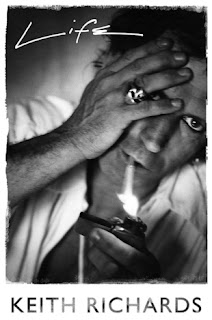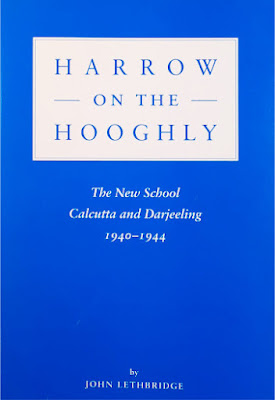Life, by Keith Richards
"with James Fox". Thoroughly engrossing, and eye opening. It's a quick read, despite topping 600 pages; and you sense it could have been much longer and still have stuff left out. For me, it strikes an ideal balance in its content. It covers almost everything you want it to cover, and despite its contradictions and changing moods - actually, because of those things - it feels honest and direct, and presents a pretty complete picture of the man.
I'm in an odd position, as someone who despite being in a great demographic to be a Rolling Stones fan - I'm twelve years younger than Richards - I never really paid them much attention, and only once bought a Stones record, for a mate for his 21st. I instinctively preferred their sound to the Beatles' ie. for its explicit blues base. But, well, hard to say, apart from getting into prog early on. However, one was always aware of the Rolling Stones. They were often in the news, in reports which also mentioned the police. And I dimly remember the news of Brian Jones' death.
After that - now I'm talking about the bulk of the book, dealing with the mid-70s onwards - I was even less aware of the band. The reason I'd have given then was that I was getting into music which was changing very rapidly, against which the Stones image-wise looked old fashioned and less 'relevant'. But reading the book provides me with a bigger reason: they left the UK for tax reasons, and became disreputable members of the globe trotting rich elite. In particular they found themselves at home in America, which suited them with having a much less febrile music scene; in other words, their music wasn't going to look out of date any time soon. Anyway, that's why in the UK we didn't really see much of them.
He talks about people. Oh blimey yes. Keith Richards is all about people, in a whole mixture of ways. Mainly, bandmates. He always, from being in the Scouts as a kid, has been one for making groups of like minded blokes - interesting as you're already thinking, only a few women as bandmates like singer Sarah Dash get mentioned - getting a group of guys to gel and work together. When one of the guys starts getting independent ambitions, or a belief that he's the real leader of the gang, Keith - 'Keef' - has never liked that. So, that's what much of the book is about, first Brian Jones, then Mick Jagger. But he does give credit to both, and it comes across as totally genuine. It's just that the other stuff is weighted with a sense of being let down.
You don't really have to take sides. Keith is like that, he fires in all directions, usually with a deep sense of what's right. Quite often you'll think he's contradicting things he says in other places. I mean, we're never like that, are we?? In the end, the only thing which will prevent more Rolling Stones music will be Old Father Time.
By the way, he makes a sharp point about reputations which hadn't struck me before; actually, it may have been in one of the YouTube videos I watched after finishing the book. It was to do with what so many have stupidly thought, including me, stuff like 'How relevant are the Stones any more?' and 'Aren't they too old to be doing arena shows or indeed any shows?' His answer is a good one: we'd never say that about the veteran black bluesmen. In other words those old bluesmen who carried on performing until they put down their guitar for the last time. I remember going to see BB King at the Manchester Arena back in the Eighties. He was certainly of pensionable age, in fact he had to have assistance to get up on to the stage. But he delivered some classic licks, some familiar vocals, and I loved it. At no point did I wonder if this was 'relevant'. So sure, the point is well made: if Keith and Mick and the (surviving) Stones want to get up on stage, and people want to see them, what's the problem?
There's a lot of poignancy in the book, in relation to women and family. It's funny but maybe unsurprising that for all of the philandering, and the sort of open relationship he had with Anita Pallenberg, he seems to feel very strongly and loyally about the woman he actually loves, and have a strong sense of family. But is that the softness of old age speaking? Maybe a little. The pictures in the book tell it that way. And it's dedicated to his wife, Patti Hansen.
What complicates this is, or was(?), not so much the philandering but the drugs. This was the part of the book which really made me feel I'd led a very sheltered life. Keith Richards is famous for having been for many years at the top of the list of 'musicians most likely to die next'. In this book he answers the question of why he's still alive. More or less. the answer is a combination, of 1) having a good constitution, 2) as much as possible sticking to the 'pure' stuff, 3) actually cleaning himself up, and, I think, 4) the fact that there was always something which meant more to him than drugs, namely music.
Any personal regrets by me? Apart from never having been to see them? I find the lack of comment about other great British guitarists a little odd. Even musicians of his own era. He talks very interestingly about his forebears, the guys who were around in the rhythm'n'blues scene while the Stones got together. But even Eric Clapton gets barely a mention, none really as a guitarist. And you'll search in vain for any mention at all of Jeff Beck, the very best guitarist I ever saw. And countless others. He (and you) might say that's not the object of the book, despite it featuring other musicians so prominently. If so, how about writing a book like that, Keith? I'd read it with massive interest, no matter whether I agreed with you or not.
Look, the book is as worth reading as all the reviewers say. It's provocative, fiery, fascinating about questions you have probably wondered about, and a slice of social history. The Stones were there at a pivotal point in the evolution of the modern music scene, they played a crucial part in it, especially in the US, and Keith Richards is the reason for their long career. Yes, he leaves out a lot, a lot has obviously been 'edited in hindsight', but this is as good a picture of the man as you're going to get. He'll never be knighted, but total respect to him, he's earned it.




Comments
Post a Comment